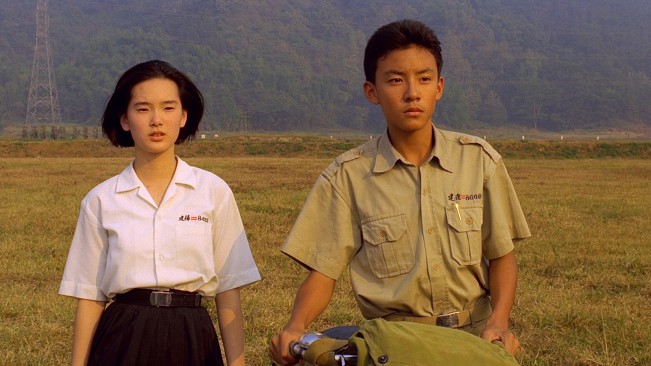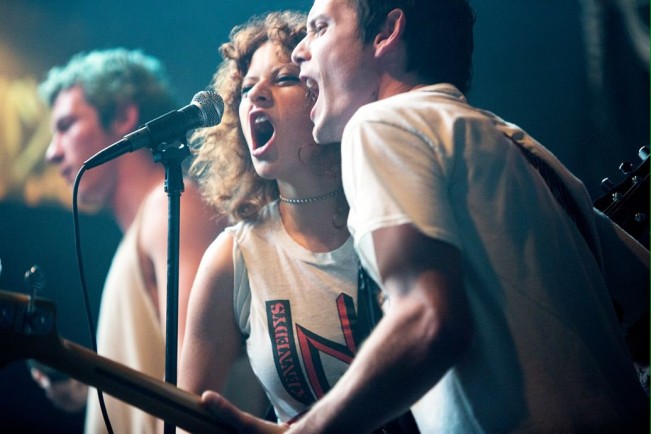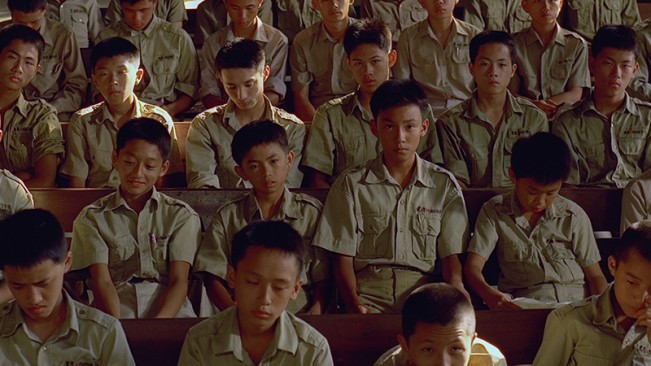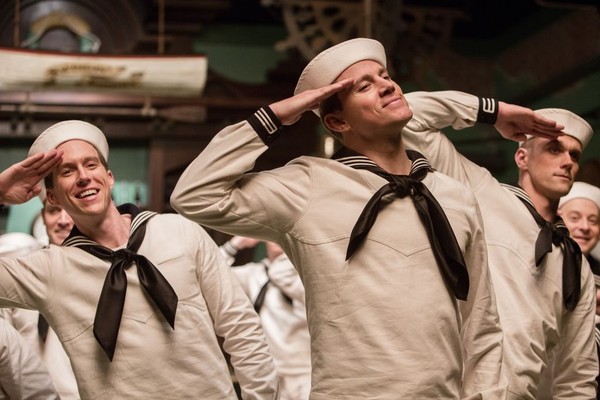Movie City Indie Archive for June, 2016
Peter Hutton At Hampshire College’s 2010 Tashmoo Lecture Series (30m)
A rich half-hour with the late sailor, filmmaker and teacher. “Peter Hutton taught at Hampshire College, Harvard University, and SUNY Purchase and Bard College. Hutton has produced more than 20 films. His work has been shown at the Museum of Modern Art and other major museums and at festivals in the United States and Europe, including Whitney Biennial.”
1 Comment »“I think it would be fun to run a campaign…” (Errol Morris, 3’26”)
But Charlie Kane appears to have been more… liquid… than latter-day flimflammers.
Quentin Tarantino Sends Students Of AFI Conservatory 2016 Out Into The Film World 1’53”
Anton Yelchin, 1989-2016
THERE WAS AN INFORMAL MEET-AND-GREET at Lucky Strike for Like Crazy. Oh, hello, Felicity Jones: English accent, tall strappy shoes, overbite. Wonderful. Charming. But the room’s bright light: Anton Yelchin. We were introduced and readily set to talking about actors and moments, mostly from the 1970s. “I wish Gene Hackman were still acting,” he said after describing specific, fleeting instants onscreen, “Every performance. You never get tired of him, he never disappoints you.” (Photo from The Green Room)
Pride, Unprejudiced: A Brighter Summer Day; Hail, Caesar!

A BRIGHTER SUMMER DAY (Criterion, $40)
 A Brighter Summer Day, the late Edward Yang’s four-hour 1991 masterpiece, set in Taiwan around 1959 or 1960, is a coming-of-age film, a love story or three or four or five. It is also a true-crime tale, a wondrous gift in so many ways. Its multitude of astonishments include a sure, novelistic mastery of accruing details in an expansive shape that is built upon observation of the smallest moments, gestures, blood-boiling fixations, fetish objects, mortal desires, moral frustrations. Yang’s extended takes, mostly from a fixed position, are an elemental building block of the devastating play of emotions. (As the story progresses, the camera tracks or dollies in quiet, assured ways at key moments.) The cast of largely teen characters, played mostly by nonprofessionals, divide themselves into gangs and do battle in a country struggling still for its own identity against both the recent history of China and the political strictures of Taiwan and the confections of the West. (The title comes from the lyric to “Are You Lonesome Tonight” as sung by Elvis Presley as well as one of the characters.) Politics and movies and fathers and sons and mothers and daughters and first love and scorching, insensate first jealousy are leavened by rock ‘n’ roll interludes and a middle passage of almost hallucinatory violence that feels like Greek tragedy and Proust and Shakespeare and electric shadows and ecstatic, otherworldly street-brawling that still holds singular bite and tang. We’ve seen all this before, but not a mosaic like this realization, this elusive yet specific fulfillment of narrative urgency, taking advantage of every instant and every inch of its generous, not-a-second-too-long duration. There is calm and there is explosion, there is rest and there is rush.
A Brighter Summer Day, the late Edward Yang’s four-hour 1991 masterpiece, set in Taiwan around 1959 or 1960, is a coming-of-age film, a love story or three or four or five. It is also a true-crime tale, a wondrous gift in so many ways. Its multitude of astonishments include a sure, novelistic mastery of accruing details in an expansive shape that is built upon observation of the smallest moments, gestures, blood-boiling fixations, fetish objects, mortal desires, moral frustrations. Yang’s extended takes, mostly from a fixed position, are an elemental building block of the devastating play of emotions. (As the story progresses, the camera tracks or dollies in quiet, assured ways at key moments.) The cast of largely teen characters, played mostly by nonprofessionals, divide themselves into gangs and do battle in a country struggling still for its own identity against both the recent history of China and the political strictures of Taiwan and the confections of the West. (The title comes from the lyric to “Are You Lonesome Tonight” as sung by Elvis Presley as well as one of the characters.) Politics and movies and fathers and sons and mothers and daughters and first love and scorching, insensate first jealousy are leavened by rock ‘n’ roll interludes and a middle passage of almost hallucinatory violence that feels like Greek tragedy and Proust and Shakespeare and electric shadows and ecstatic, otherworldly street-brawling that still holds singular bite and tang. We’ve seen all this before, but not a mosaic like this realization, this elusive yet specific fulfillment of narrative urgency, taking advantage of every instant and every inch of its generous, not-a-second-too-long duration. There is calm and there is explosion, there is rest and there is rush.
In Saul Austerlitz’s essential 2002 “Senses of Cinema” survey of Yang’s work, he writes, “Yang’s use of music in A Brighter Summer Day is a nod toward the theses of his contemporary films, with the youths’ love for American music an early foray of Western culture into Taiwan, displacing an earlier, more traditional cultural practice. Yang’s understanding is that there never has been an indigenous culture in Taiwan—it has always been an amalgam of its various conquerors’ cultures. In this, Taiwan is ahead of the curve in experiencing the contemporary global hybridity of culture, a fact that explains the remarkable universal relevance of such master filmmakers as Yang, Hou Hsiao-hsien and Tsai Ming-liang.” Yang died in 2007 at the age of fifty-nine after a long illness, a major loss to cinema, but there’s Yi Yi and my god, there’s this epic attainment. I was fortunate to have a preview screening at Chicago’s Siskel Film Center, which began early and afterwards was the first warm afternoon in Chicago in weeks, and I walked through the Loop, circling, circling, amid faces and figures turning in their own fashion, to their own fates. I was lost yet I was found. It was as if the movie I had seen, its ninety-two locations would not dissipate. All one-hundred-plus characters. They weren’t ghosts. Essential viewing. The Criterion Blu-ray includes the 4K digital restoration with uncompressed soundtrack; new audio commentary with Tony Rayns; Our Time, Our Story, a 113-minute documentary (2002) about the New Taiwan Cinema movement, which includes interviews with Yang, Hou Hsiao-hsien, Sylvia Chang, and Tsai Ming-liang; Yang’s 991 director’s statement; and an essay by Godfrey Cheshire. (Criterion, $40.)
Also recommended: David Bordwell goes long on Brighter Summer Day and Yang’s origins in Taiwanese cinema. “Although it was shot as a theatrical feature, it fits surprisingly well into today’s taste for long-form TV narratives. With over eighty speaking parts, it’s a very thick slice of life from 1960 Taipei. Indeed, Tony Rayns’ commentary reports that Yang said he had developed enough story material for three hundred TV episodes. If you like soaking in a richly realized world, here’s a movie made for you.”
HAIL, CAESAR! (Universal, $40)
The latest Joel and Ethan Coen joint, Hail, Caesar!, is only superficially a satire of the entitled, juvenile doings behind the scenes at an apocryphal 1950s Hollywood studio, Capitol Pictures, modeled in matters small and large after MGM as well as the Melrose Avenue landscape of Paramount Pictures, and, too, bearing the same name as the studio that was large in the nightmares of one Barton Fink. There are layers upon layers beneath the expectedly detailed surface, which, as Jeet Heer has noted, “Almost all Coen Bros. movies defeat reviewers because films reveal themselves only after being lived with and re-watched.” (Heer’s epic forty-bullet-point tweetstorm on the film is here and worth the soak.) The first level I threw out: Hail, Caesar! is what might have been going on back at the studio while Preston Sturges’ Sullivan’s Travels director was out on the road looking for oh-so-serioso subject matter.
It’s a sleepless day and night and morning for Eddie Mannix (Josh Brolin in full simian complexity), the “head of physical production” of a full-tilt production slate with many moving parts and parts for all manner of Hollywood archetypes. While he has higher responsibilities, Mannix is patterned after a real-life tough nut, a fixer of the same name who worked for MGM. Being a Coen picture, their Mannix is soft at the core and better for it, yet one more of their Men Who Weren’t There, a man taken for a rustic and a rube, a Rosencrantz and a Guildenstern, who in fact makes the production schedules run on time. (There are also more than a few allusions to a little-known footnote to Hollywood history, a hardly chronicled figure who made the transition from paid-for fall guy to a particular crew position who could make his own fantastical non-satirical epic in another time and movie. I won’t divulge the name, but it’s more than apparent the Coens know the grand, bawdy tales of this figure, and maybe even met him before the end of his long life. Or not.)
The kidnapping of one Baird Whitlock (George Clooney at his Coenesque gooniest) from the set of “Hail, Caesar! A Tale Of The Christ” sets Mannix in motion. Whitlock has been abducted in full Roman garb by a crew of Malibu-meeting Communist screenwriters calling themselves “The Future.” “You’ve got a call from The Future” is one of the least eccentric lines in the spiky, sometimes sparkling script, which includes “It’s not really a dirndl,” Clooney’s character complaining of “300 miles of Frankish road” and an insert card during dailies that reads “Divine Presence To Be Shot.” The daily goings-on at the studio also allow the Coens to dip into scenes that are being confabulated in multiple genres of past eras, including Scarlett Johansson in a choreographed mermaid musical, the sorrows of a singing cowboy and a drawing-room drama cast with inappropriately ungenteel actors.
Odd arcana crunches underfoot in most every scene. Tilda Swinton turns up as twin gossips, Thora and Thessaly Thacker, Hedda Hopper and Louella Parsons as if they were born sisters like Dear Abby and Ann Landers, demarcated by swooping, stabbing aerodynamic hats. At a Chinese restaurant much like West Hollywood’s Formosa Café (a couple miles east of the Paramount lot), a scout for Lockheed hopes to summon Mannix into the future, which sounds much like a Thomas Pynchon novel or two to come, where he’d leave the “circus” of the studio’s fixing and human interaction behind for a “ten-year contract.” Historically suggestive proper names clatter without referents: Hogarth, Van Vechten. As par for their course, the Coens appreciate the savory sound of mid-century surnames,.
There’s a colorful snippet of a scene that goes to great and subterranean pains to link the lineage of Hail, Caesar! to unmade movies like “Hey Hey In The Hayloft,” one of the prior travails of the director John Sullivan in Sullivan’s Travels. In a darkened edit suite, Frances McDormand is the studio’s editing fixer C. C. Calhoun, coils of cigarette smoke and curls of hair and ringlets of 35mm film stock installed behind a Moviola, showing Mannix a scene that could reveal whether an extra might have been one of the men who kidnapped Whitlock. As they watch, the machine starts to strangle C. C., who disengages herself from near-death with a tossed off “I shouldn’t wear scarves.” The indelible allusion: Preston Sturges’ prestidigitation of a childhood across cosmopolitan reaches of several continents came from his mother, who was assistant-cum-amanuensis to legendary dancer Isadora Duncan, whom she gifted with a huge silk scarf that strangled Duncan when it became tangled in the spokes of her convertible roadster. If the Coens embed their japery that deeply, there’s more to divine from this seemingly superficial, largely pop-poppy confection than the On The Town-inspired Channing Tatum-featuring tap-dance musical number. (The BR/DVD release has superficial extras, better backstage bits awaiting a likely Criterion edition.)












